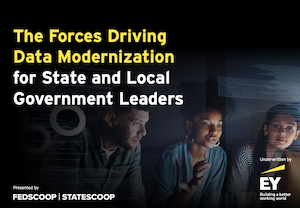- Sponsored
- Insights
Grasping data modernization in state and local governments

With emerging technology like artificial intelligence beginning to reshape the public sector, a comprehensive understanding and the strategic use of data is becoming increasingly crucial, especially before leaping into ambitious modernization projects. For state and local government leaders, quality data is no longer just an operational necessity; it’s a strategic asset that can drive innovation, efficiency, and public trust.
Yet a new report, “The forces driving data modernization for state and local leaders,” found that fewer than half (44%) of state and local government leaders say their agency effectively manages its data to meet its operational needs — and only a third (34%) say their data policies align with their agency’s goals.
Among other key findings, the report found that nearly half of the respondents viewed managing risks associated with new technologies, including AI, as a top motivator for data modernization. “You cannot do AI without automation, and you cannot have automation without good data,” the report notes.

Based on a new survey of 168 prequalified program, operations, IT and security leaders at state and local government agencies, the report identified challenges and opportunities with data modernization practices they face in their efforts to develop more robust data governance models and utilize their data on a larger scale.
The report, produced by Scoop News Group for StateScoop and FedScoop, and underwritten by EY, also assessed:
- The maturity of data management capabilities at state and local agencies.
- The primary motivations propelling agencies to modernize data management.
- How effectively agencies meet the data needs of their employees and partners.
- Potential steps that state, county and municipal government officials are considering to expedite the effective utilization of their data on a larger scale.
Although 9 in 10 state respondents and 3 in 4 county/municipal respondents have formalized enterprise data management governance principles in place, only about one-third possess data architecture advanced enough to handle upcoming demands, the study found.
At the same time, roughly 6 in 10 agency leaders reported that the number of data sources they rely upon has increased by 20% or more in the past three years in the face of shrinking IT budgets — which adds to the need for more effective data modernization.
Key findings include:
Predominantly centralized data management
More than 60% of the respondents indicated the mission-critical data they rely on is centralized versus federated, which plays a role in their approach to modernization. However, perceptions vary between business executives and IT leaders, who presumably have a more precise feel for how data is managed. A higher proportion of IT executives reported that their operations rely on federated data compared to business executives, suggesting potentially different views on the best path toward data modernization.
Challenges and resource constraints
The main hurdles in implementing and enforcing data governance include limited resources, reliance on third parties for data management, and lack of leadership or governance roadmap. These challenges highlight the need for more focused resource allocation and strategic planning in data management practices.
Data utilization and modernization timelines
A large portion of respondents believe that devoting more resources to employee training around data use/analytics is crucial for accelerating data utilization effectively. Additionally, respondents anticipate a varied timeframe for modernizing data management capabilities to capitalize on AI’s potential— IT executives at the state and local levels are more bullish than business executives about updating their agency data management capabilities in the next 6-24 months.
As agencies move further into the digital age, the ability to harness the power of their data will be a defining factor in their capacity to serve their constituents efficiently, innovate responsibly and remain competitive.
Download the forces driving data modernization for state and local government to learn more.
This article was produced by Scoop News Group for FedScoop and StateScoop and sponsored by EY.



